by Cynthia Rylant
This may be grossly unfair but this is the sixth Newbery Award winning book focusing on how to deal with the loss of a loved one. As a result, I started and put down the book five times.
The story of an orphan, passed from relative to relative till ending up with her Aunt May and Uncle Obe is disconcerting, reflecting the angst and uncertainty many young people feel. Losing and missing her Aunt May, and how she and Obe deal with it, seems a less than ideal recommendation. When Obe starts to hallucinate or imagine May’s presence, he is encouraged at every turn by Summer and her school friend, Cletus.
Both May and Obe were eclectic and eccentric. They collected artistic and elaborate whirlygigs and mounted them inside their mobile home, and Summer clearly assumes that, though loved, she is part of the collection. After May dies, Obe becomes erratic till Cletus, a collector of empty potato chip bags and photos, visits. While I appreciate the authors point about accepting quirkiness, I found myself becoming distanced from the characters and their plight by the sheer volume of strange until I reached the following passage:
“May would have liked (Cletus). She would have said he was “full of wonders, “same as Ob. May always liked the weird ones best, the ones you couldn’t peg right off. She must be loving it up in heaven, where I figure everybody must just let loose. That’s got to be at least one of the benefits of heaven—never having to act normal again.”
And maybe that WAS the point. Dealing with devastating loss makes everything feel strange. Even normal is disorienting. Shying away from the odd and peculiar at that point is not jut futile, but counterproductive. When Summer finally broke down and cried at her loss for May, it was only after she saw Obe go through his own catharsis. Only after he was “taken care of” could she fully grieve. What was unspoken in the book, but obvious to adult readers, was that Obe was doing the same. Both cared enough about the other to help them through this dreadful time, but put off their own needs to do it. In the end this only extended the pain.
Missing May is about the need to grieve for your loss, and to help others at the same time. Getting back to “normal” is less important than letting go of the pain.
Lesson plans can be found at:
at:http://www.glencoe.com/sec/literature/litlibrary/pdf/missing_may.pdf
Tuesday, March 20, 2007
Subscribe to:
Post Comments (Atom)






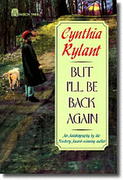







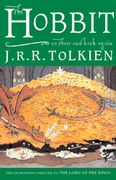







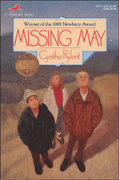
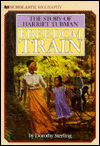











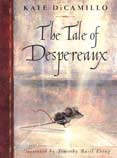






1 comment:
I, too, had a difficult time getting into the book. However, I could relate with the feelings that Summer seemed to be living through, with the death of a loved one and wanted desperately to allow life to get back to normal. It's not that you want to forget the departed, you just want to "feel" again. I was a bit creeped out by Cletus, at first, but when I met his parents, I had a "Summer moment". I realized that he was special and important, and that I shouldn't allow his different behavior to cloud my attitude toward his caring and passionate side about life. I hope that he gets to work in the capitol of West Virginia someday.
By the way, very nice blog site. I can see that you have been working hard on it! :)
Post a Comment